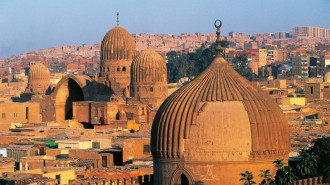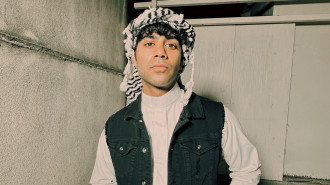![Lebanese of Armenian origin raise Armenian, national and Nagorno-Karabakh flags as they take part in a rally organised by the Tashnak party, in support of the Armenians of Nagorno-Karabakh, in the capital Beirut's eastern suburban neighbourhood of Bourj Hamoud [Getty Images]](/sites/default/files/styles/image_360x240/public/2021-10/GettyImages-1228981262.jpg?h=3ac079aa&itok=Yw8c1UQt)
As Lebanon continues to collapse, its Armenian community disappears
![Lebanese of Armenian origin raise Armenian, national and Nagorno-Karabakh flags as they take part in a rally organised by the Tashnak party, in support of the Armenians of Nagorno-Karabakh, in the capital Beirut's eastern suburban neighbourhood of Bourj Hamoud [Getty Images]](/sites/default/files/styles/image_360x240/public/2021-10/GettyImages-1228981262.jpg?h=3ac079aa&itok=Yw8c1UQt)
In the suburb of Bourj Hammoud, nicknamed "Little Armenia" by its inhabitants, the buildings, entangled with one another, are now progressively abandoned by their occupiers.
In the once crowded streets of the neighbourhood, which is home to most of Lebanon's Armenian community, the population is shrinking day by day.
Since life in Lebanon has become “impossible” these past two years, its inhabitants are turning to immigration as their only hope. Armenians, for their part, are massively considering a transfer from their birthplace, Lebanon, to their second homeland, Armenia.
The Armenians of the diaspora, who took refuge in Lebanon after the massacres in 1915, distinguish themselves by their love for their host nation while maintaining a strong attachment to their motherland. The Armenian people, scattered all over the world by the torments of history, are at the same time united around Armenia, and plural by their multiple identities.
"As of the Armenians of Lebanon, they have inherited the curse of their two homelands. Exiled to Lebanon a hundred years ago, they are now forced to emigrate to Armenia, leaving a part of their soul behind every time"
In Lebanon, the Armenian community willingly embraces this dual identity, its members proudly calling themselves "Lebanese Armenians". The Armenian community possesses Lebanese citizenship, is part of the 18 confessions recognised by the Lebanese state, and has its own representation in Parliament. The community, known for its skills in jewellery and handicrafts, participates fully in the country's economy.
But as Lebanon sinks into poverty, famine, and multiple shortages, Armenians are forced to leave their country for their original homeland, a departure perceived as a heartbreak for most of them who have only known Lebanon in their life.
Christine Armo, a young Lebanese-Armenian who left Lebanon this year for Armenia, says she had planned to leave Lebanon after graduation, in 2022. After the explosion in the port of Beirut, which devastated Bourj Hammoud and aggravated the economic crisis, "I had to leave right away, I was afraid for my own safety.” Christine took with her love and attachment to Lebanon, just as she carried Armenia in her heart since her birth.
Christine admits that Armenia is far from being an ideal country in terms of living standards, but for her and her loved ones, it represented the only way to escape a country in total collapse. "Everyone who graduates leaves Lebanon, and most of them go to Armenia. I see a lot of people from my university here in Armenia now," says Christine. "It's very difficult to find housing in Armenia, because of the influx of Lebanese Armenians, which creates tension in real estate," she adds.
The number of Armenians in free fall
Even before the crisis, the Armenian community was gradually shrinking due to the emigration of its youth. The number of Armenians over 21 years old was estimated at 107,000 in 2018 against 112,000 in 2009, which constitutes a decrease of four percent in nine years. In the same period, the number of overall Lebanese over 21 years old increased by 12 percent.
This population decrease is mainly due to the mass precariousness suffered by the Armenian community, which is historically more exposed than others to poverty in Lebanon. Since the onset of the economic crisis, this haemorrhage has increased dramatically, with entire families now emigrating. Statistics are absent, but references indicate that their number is now well under 40,000 individuals.
|
“The Armenian embassy was completely packed with people wanting to do their papers, and an embassy employee told me that one month after the explosion, already 350 Armenian families had left Lebanon," says Alik Kambourian, a Lebanese Armenian living in Lebanon. "But a lot of people can't afford to leave. They can't sell their houses in Lebanon, so they are stuck here," she adds. Lebanese Armenians, mainly artisans and entrepreneurs with small businesses, have been hit hard by the banking crisis and economic collapse.
Today, as Lebanon suffers one of the worst economic crises in the world since the 19th century, while 82 percent of the Lebanese population has fallen into poverty, Armenians are among the first victims of the crisis. Because of the administrative ease of immigration and obtention of citizenship, Armenia is an obvious destination for Armenian families in Lebanon.
Vartkes Varak Hasholian, an architecture student at the American University of Beirut, told The New Arab: "If you are Armenian, you can easily leave and find a job there, even if the wages are low.” Although he does not plan to emigrate now, he may plan to leave after graduation.
He adds that obtaining Armenian citizenship is very easy via the embassy in Beirut. "There are very few requirements."
"[The Armenian] population decrease is mainly due to the mass precariousness suffered by the Armenian community, which is historically more exposed than others to poverty in Lebanon"
In Armenia, most people view the return of their Lebanese compatriots favourably, but integration can still be difficult. Most Lebanese Armenians have no family in the country, coming mostly from Western Armenia, now located in Turkey. In most cases, newcomers find themselves alone in a country they do not know or have only visited a few times in their lives.
"There are many cultural differences, we speak the Eastern dialect and not the Western one, and our culture has received a lot of input from Arabs, Persians, and Turks while theirs is closer to Russia and Eastern Europe," adds Vaha, as most newcomers are facing a cultural shock.
A "Little Lebanon" in Armenia
In this context, Lebanese Armenians mobilise to organize the transition and welcome the newcomers to Yerevan as much as they can. A "Little Lebanon" was thus born in the Armenian capital, around a community that is certainly Armenian but kept its Lebanese and Middle Eastern specificity.
Vahan believes that the Lebanese specificity will not disappear with time, stating that: "Our Lebanese identity is a part of us, no matter where we are. Many Lebanese, just like Syrian Armenians have settled in Armenia and brought their way of life, traditions, and values.” For example, several schools in the country now teach in Western Armenian.
The Lebanese Armenians in Armenia are grouped together and have strong relationships with each other. For instance, they go to the same church, the Apostolic Orthodox Church and the Catholic Church. Usually, Lebanese Armenians are perceived as more religious than the people of Eastern Armenia and more traditional in their beliefs.
"Our Lebanese identity is a part of us, no matter where we are"
Lebanon, Armenia, and Palestine are the only countries in the world where the diaspora population number exceeds the local population’s one.
Palestinians have been condemned to asylum, Armenians to dispersion, and Lebanese to permanent emigration.
As of the Armenians of Lebanon, they have inherited the curse of their two homelands. Exiled to Lebanon a hundred years ago, they are now forced to emigrate to Armenia, leaving a part of their soul behind every time.
Sami Erchoff is a freelance journalist based in Beirut




 Follow the Middle East's top stories in English at The New Arab on Google News
Follow the Middle East's top stories in English at The New Arab on Google News


